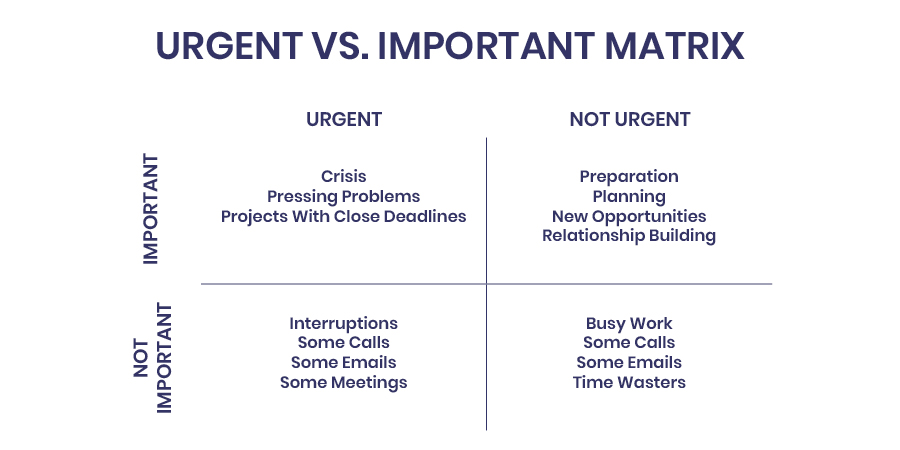Download Our eGuide: 3 Key Benefits of Outsourcing HR
Learn more about outsourcing HR to help you save costs, stay compliant, relieve administrative burden, and more.
Keeping yourself and your employees on track with individual roles and responsibilities is a priority. But it becomes much more challenging when everyone ends up focusing too much time on urgent work (in all its many guises) instead of the really important work that brings long-term value to the business. Here’s a closer look at what urgent vs. important means in the broad sense, how it applies to human resources, and how using an HR partner ensures everything gets done without sacrificing the bigger strategic picture for your business.
This concept is illustrated in the matrix below:

Urgent but not important work tends to encompass things like calls, emails, and meetings. It’s a lot of the daily interruptions that add up over time and prevent you or your team from being productive. No matter what the interruption is, when there’s a sense of urgency around it, it can put people in a reactive, high-stress mode. Most people hurry to get through urgent work so they can resume other, more important activities.
Sometimes work is neither urgent nor important. It often takes the form of busy work that can be pushed off to another day or handled when there’s a break in the action.
On the other hand, certain work can be both urgent and important—such as a sudden crisis or work that has a definite deadline or timeframe in which it has to be finished. This type of work takes considerable effort to manage and complete, and often there can be risks associated with it that have to be carefully thought through. It requires high focus and suffers if mistakes are made.
Finally, there is important but not urgent work. This is where you, as the business owner, can really shine since it encompasses high-value, strategic planning and initiatives. It involves work like building new relationships, seeking new opportunities, becoming more competitive, and driving revenue growth. The important but not urgent work happens steadily over a period of time and requires dedication and commitment. Without the ability to focus enough time and energy on it, the results are less effective since your attention—and that of your team members—is likely being pulled in too many directions.
As part of a small business, you might have to wear a lot of hats, especially if you head up a smaller operation. On any given day, you could divide your time between long-term planning and strategy and a dozen short-term fires that require immediate attention. Each of these falls into urgent work or important work. An HR partner can make it easier to do both.
In the workplace, how everyone spends their time is a critical reflection of how well-positioned the business is for growth.
An HR partner can take on most of your current administrative work. If you’re the one managing human resources, you might be using precious hours on tasks like payroll and administering benefits. If you’re fortunate to have an in-house HR team, you can lean on them to manage all the tasks that keep workplace and employee relations running smoothly, but you may still need to give your input or get involved when there’s an issue.
Outsourcing HR to a trusted partner helps you accomplish two of the most valuable quadrants from the matrix above: urgent and important work, and important but not urgent work.
An HR partner is adept at taking on urgent and important work. They have the capacity, expertise, and tools to handle the volume and administrative burden of a number of HR tasks, including payroll, benefits, managing daily HR operations, and keeping up-to-date and compliant with changing laws and regulations. An HR partner supports your business by handling the urgent and important work for you so you and your team can avoid getting bogged down with it to the exclusion of everything else. When your team is able to spend less time in their day on burdensome paperwork, they’re less stressed and more engaged in their jobs, and they can focus more of their energy on helping to drive strategic initiatives.
Your important but not urgent work can also benefit from an HR partner. When looking out over your business goals and the changes that are constantly happening in the larger business landscape, an HR partner is an invaluable resource. Their experts can consult with you on your short- and long-term needs, whether it’s expanding your staff, developing a sustainable and competitive business culture that improves morale and attracts new talent, or offering targeted training and professional development programs to build new skills and nurture employee success. An HR partner brings a wealth of knowledge and best practices to the table that supplement and inform your strategic efforts.
With an HR partner, everyone on your team can row in the same direction. They’re able to focus more effectively on their individual roles and responsibilities as well as the bigger picture goals. And you can rest easier knowing that important HR tasks won’t fall through the cracks or be mishandled. To learn more about the benefits of outsourcing HR to a partner, including how you and your team can spend more time on high-value, strategic work, download the guide.
Learn more about outsourcing HR to help you save costs, stay compliant, relieve administrative burden, and more.